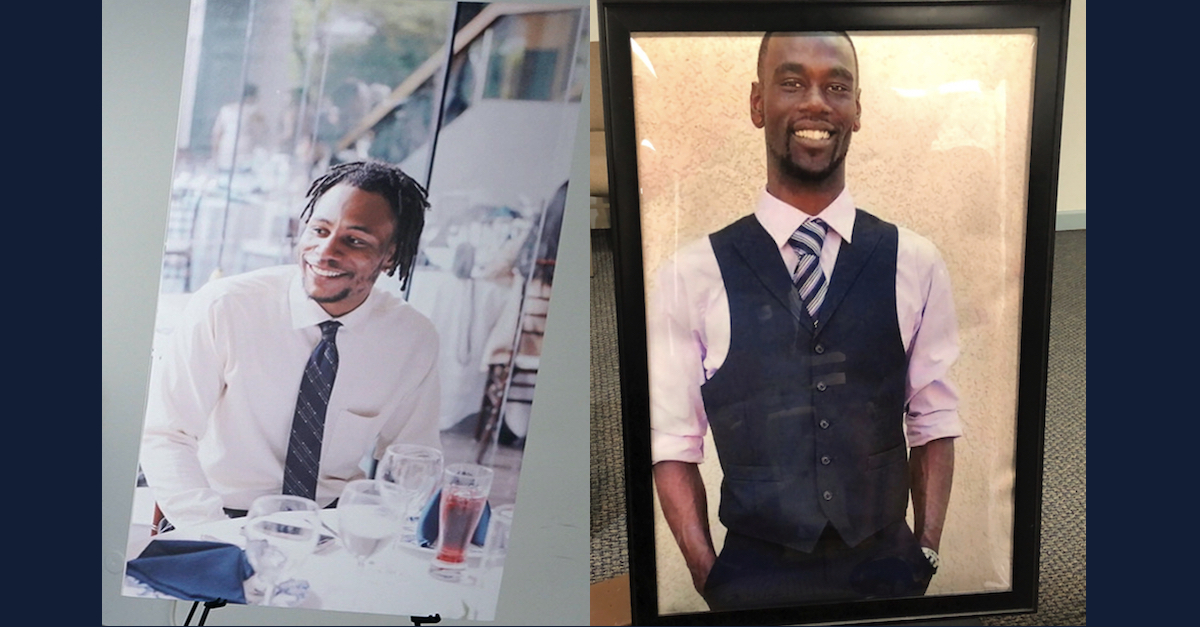
A picture of Keenan Anderson, left, who was shocked with a Taser multiple times during a struggle with LAPD officers and died. (AP Photo/Damian Dovarganes) A photo of Tyre Nichols displayed at a memorial service for him on Tuesday, Jan. 17, 2023, in Memphis, Tenn. Nichols was killed during a traffic stop with Memphis police on Saturday, Jan. 7, 2023. (AP Photo/Adrian Sainz)
United Nations human rights experts on Friday accused U.S. law enforcement of violating international laws and obligations prohibiting torture or other cruel, inhuman, or degrading treatment or punishment in response to the recent in-custody deaths of two Black men following interactions with police in California and Tennessee.
Yvonne Mokgoro, the chairperson of the UN International Independent Expert Mechanism to Advance Racial Justice and Equality in the context of Law Enforcement, urged action.
“The brutal deaths of Keenan Anderson and Tyre Nichols are more reminders of the urgency to act,” she said in a news release.
Anderson, a 31-year-old Black father, high school English teacher, and cousin of the co-founder of the Black Lives Matter movement died on Jan. 3 after being repeatedly shocked by a Taser by Los Angeles police following a traffic crash.
“They’re trying to George Floyd me,” Anderson says during the altercation in an edited, nearly-20-minute video that includes officers’ body-worn camera from the aftermath of the initial interaction in Venice. “They’re trying to George Floyd me.”
Nichols, 29, was beaten to death on Jan. 7 by five members of the Memphis Police Department as he cried for his mother. The violent encounter was caught on video. The officers involved in Nichols’ death were fired from their jobs and have been charged with murder.
Legal experts with the UN Human Rights Office of the High Commissioner said they were seeking detailed information on both the Anderson and Nichols deaths on the ongoing investigations and regulations applicable to the use of less-lethal weapons “vis-à-vis applicable human rights standards,” the organization said.
The human rights law experts accused police of actions that appear to have violated international norms protecting the right to life as well as the United Nations Code of Conduct for Law Enforcement Officials and the Basic Principles on the Use of Force and Firearms by Law Enforcement Officials.
“We observe that, in cases like these, police officers use Tasers as a routine protocol to incapacitate non-compliant or individuals going through mental health crises, who often do not appear to pose a serious danger to themselves or others,” Juan Mendez, a member of the Expert Mechanism said in the news release. “We remain highly concerned about the excessive use of tasers in law enforcement, especially in light of their inherent potential for misuse.”
Nichols, who was punched, kicked, and beaten with batons, the UN experts said that in addition to criminal charges against the officers and redress for his relatives, U.S. authorities “should show determination in questioning and reforming an institutionalized police culture that permits criminal assault under the guise of law enforcement and public safety.”
The news comes after other legal advocates have called out both police departments in the deaths.
The NAACP Legal Defense Fund said in a news release that the LAPD deployed the Taser on Anderson for “an unconscionable length of time.”
Civil rights attorney Tony Romanucci described Nichols as “a human piñata for those police officers” and said the footage showed “an unadulterated, unabashed nonstop beating.”
International concern with U.S. police violence is nothing new.
In June 2020, George Floyd’s family and legal representatives filed an “urgent appeal” with the UN to intervene in Floyd’s legal case and to make recommendations on how the U.S. can institute systemic policing reform.
In May 2021, just before the first anniversary of Floyd’s murder, a coalition led by the American Civil Liberties Union, legal advocates, and nearly 200 families of people who say they’ve been victimized by law enforcement filed a request with the UN High Commissioner for Human Rights asking for the launch of a formal human rights inquiry into police violence and systemic racism throughout the United States.
In December 2022, the U.S. government formally invited the Expert Mechanism to look into institutional racism in American law enforcement, the UN body said. The official mission will begin in April.
“We will engage with the Government and all relevant stakeholders to ensure that police brutality is addressed with determination and that victims and their families obtain justice,” Mokgoro said.
Representatives from the LAPD and the Memphis Police Department did not immediately respond to requests for comment.